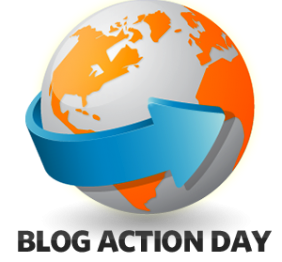Blogs all across the world are talking about human rights today. For the fourth year in a row I am taking part in Blog Action Day.
 This year the topic is human rights.
This year the topic is human rights.
I am going to share with you might thoughts on the relationship between the Internet and human rights.
Imagine what it would be like if every day, a cloaked figure followed you around, observing your every action and taking notes. It would be a bit creepy wouldn’t it, not to mention the privacy issues.
Back in 2011, I wrote a post asking whether everyone should be entitled to use the Internet and whether in fact it should be a human right. Founder of Facebook Mark Zuckerberg believes that it should be; make your own decision as to whether this is only because he wants more business for his site.
So, imagine what it would be like with Mark Zuckerberg following you around all day, taking notes on what you do, invading your privacy… hold on, if you are on Facebook, he kind of does.
See how I linked that. 😉
I am no stranger to complaining about Facebook, but it isn’t the only culprit, Google is also a huge threat to online privacy. It stores all information it collects about you for at least 18 months. Why? In the words of Hungry Beast, because “Google wants to know who you are, where you are and what you like, so it can target ads at you.” Check out Hungry Beast’s video to scare yourself.
So to get to the point, I don’t believe access to the Internet need be a human right, (not yet anyway) however I do believe that the right to privacy online should be.  Article 12 of the United Nations Universal Declaration of Human Rights states:
Article 12 of the United Nations Universal Declaration of Human Rights states:
“No one shall be subjected to arbitrary interference with his privacy, family, home or correspondence, nor to attacks upon his honour and reputation. Everyone has the right to the protection of the law against such interference or attacks.”
Why does this not cover our online lives too? Should Google, Amazon, Facebook, Yahoo and Apple (and others) be allowed to monitor us so much?
I shall keep this short and sweet and leave you with those thoughts.




